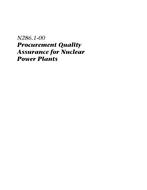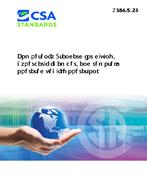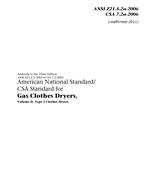Preface
This is the fourth edition of ANSI Z21.74 Standard for Portable refrigerators. It supersedes the previous editions published in 2014, 1992, and 1983. This Standard was prepared by the Z21/CSA Joint Technical Subcommittee on Standards Gas-Fired Refrigerators and Portable Camping Equipment, under the jurisdiction of the Z21/83 Technical Committee on Performance and Installation of Gas Burning Appliances and Related Accessories and had been formally approved by the Technical Committee and the American National Standards Institute.
Scope
1.1 This Standard covers gas-fired refrigerators employing the absorption or adsorption principle of refrigeration, hereinafter referred to as refrigerators or appliances, having refrigerated spaces for: a) storage of foods; or b) storage of foods and making ice; or c) storage of frozen foods and making ice; or d) storage of foods and the storage of frozen foods and making ice. This Standard applies to newly produced, unvented, portable refrigerators constructed entirely of new, unused parts and materials, with input ratings of 1000 Btu per hour (293 W) or less, and which are for use with propane gas, butane gas, or propane-butane gas mixtures which are referred to as LP-gas. If a clause references a specific gas then that clause is limited to the specific gas. These refrigerators are intended for use both indoors in adequately ventilated structures and outdoors. 1.2 This Standard applies to portable type gas refrigerators having: a) a regulated outlet pressure when connected to a self-contained propane gas supply system having a maximum size of 20 lb (9.1 kg) of fuel and operating at a regulated outlet pressure not to exceed 11 inches water column (2.74 kPa); b) a regulated or non-regulated outlet pressure when connected to a self-contained fuel supply using either a CGA No. 600 or UL 147B connection and a disposable cylinder of nominal water capacity of 2.7 lb (1.1 kg) [nominal 1 lb (0.45 kg)] LP-gas or less. Portable refrigerators are intended for use as described below: a) for indoor use in small recreational enclosures, provided that the enclosure have means for adequate combustion air and ventilation. The portable refrigerators are for use with a CGA No. 600 or a UL 147B connection and a disposable cylinder of nominal water capacity of 2.7 lb (1.1 kg) [nominal 1 lb (0.45 kg)] LP-gas or less; b) for outdoor use with a self-contained propane gas supply system having a maximum size of 20 lb (9.1 kg) of fuel, when operating at regulated outlet pressure not to exceed 11 inches water column (2.74 kPa); c) for outdoor use with a CGA No. 600 or UL 147B connection and a disposable cylinder of nominal water capacity of 2.7 lb (1.1 kg) [nominal 1 lb (0.45 kg)] LP-gas or less. Butane and butane-propane mixture cylinders are limited to a maximum capacity of 10 oz (284 g) of liquid fuel. 1.3 This Standard applies to refrigerators connected to: a) an integral LP supply cylinder; or b) a remote propane supply cylinder. Fuel supplies are to be in accordance with the Standard for the Storage and Handling of Liquefied Petroleum Gases, NFPA 58. 1.4 This Standard applies to refrigerants in quantities not exceeding 6 lb (2.7 kg) and that comply with the applicable provisions of the Standard Safety Code for Mechanical Refrigeration, ASHRAE 15. 1.5 This Standard also covers all electrical equipment, wiring, and accessories built in or supplied with refrigerators for use with low voltage direct current or alternating current. 1.6 If a value for measurement as given in this Standard is followed by an equivalent value in other units, the first stated value is to be regarded as the specification. 1.7 All references to psi throughout this Standard are to be considered gauge pressures unless otherwise specified. 1.8 This Standard contains SI (Metric) corresponding to the yard/pound quantities, the purpose being to allow the standard to be used in SI (Metric) units. IEEE/ASTM SI 10, American National Standard for Metric Practice, or ISO 80000-1:2009, Quantities and units ? Part 1: General, is used as a guide in making metric conversion from yard/pound quantities.) If a value for a measurement and a corresponding value in other units are stated, the first stated value is to be regarded as the requirement. The given corresponding value may be approximate. If a value for a measurement and a corresponding value in other units are both specified as a quoted marking requirement, the first stated unit, or both shall be provided. 1.9 In this Standard, “shall” is used to express a requirement, i.e., a provision that the user is obliged to satisfy in order to comply with the standard; “should” is used to express a recommendation or that which is advised but not required; and “may” is used to express an option or that which is permissible within the limits of the standard. Notes accompanying clauses do not include requirements or alternative requirements; the purpose of a note accompanying a clause is to separate from the text explanatory or informative material. Notes to tables and figures are considered part of the table or figure and may be written as requirements. Annexes are designated normative (mandatory) or informative (non-mandatory) to define their application.
Product Details
- Edition:
- 4th
- Published:
- 12/01/2017
- ISBN(s):
- 9781488306969
- Number of Pages:
- 85
- File Size:
- 1 file , 1.9 MB
- Product Code(s):
- 2425048, 2425048, 2425048


